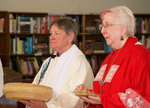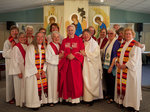As a devout Catholic schoolgirl in the 1950s, Judy Dahl was certain that she had been called to become a priest.
She was, of course, dreaming the impossible dream. For centuries, the Catholic …
This item is available in full to subscribers.
We have recently launched a new and improved website. To continue reading, you will need to either log into your subscriber account, or purchase a new subscription.
If you had an active account on our previous website, then you have an account here. Simply reset your password to regain access to your account.
If you did not have an account on our previous website, but are a current print subscriber, click here to set up your website account.
Otherwise, click here to view your options for subscribing.
* Having trouble? Call our circulation department at 360-385-2900, or email our support.
Please log in to continue |
|


As a devout Catholic schoolgirl in the 1950s, Judy Dahl was certain that she had been called to become a priest.
She was, of course, dreaming the impossible dream. For centuries, the Catholic Church has insisted that the priesthood is restricted to men. Even Pope Francis, the popular reformist, has made it clear that “the door is closed” to women.
Last weekend, however, Dahl’s dream was fulfilled when she stood at the front of the Cape George Colony clubhouse and, in a solemn and ancient ceremony, was ordained a priest by nearly 200 friends, neighbors and fellow Catholics.
When formally asked if she was prepared for her mission, she grinned and announced to her congregation: “I am ready. I am so ready!”
Dahl is under no illusions that her ordination will be recognized by the Catholic Church – “probably not in my lifetime,” she says. Nor will any of the other nearly 200 women in the United States and Europe who have been ordained by Roman Catholic Women Priests (RCWP), an international group of devout Catholics founded on a boat in Germany’s Danube River for the purpose of defying and changing a fundamental church doctrine.
But it’s safe to say that, with or without Vatican recognition, few priests in the U.S. or across the globe have been ordained with the knowledge, experience and credentials Dahl brings to the vocation. Over her long career, she has served as a cloistered nun, earned a doctorate of divinity from a prestigious seminary, served 30 years as a full-time pastor in the U.S. and abroad, and much, much more.
Judy Dahl is a passionate 68-year-old perhaps best-known for a beatific smile that appears to have been painted by a Renaissance master.
A Port Townsend resident for nearly a decade, she set off on her spiritual journey half a century ago in Phoenix, where she grew up in a staunch Catholic family. She attended Catholic schools and then joined a Benedictine convent in Minnesota.
“I was there three years,” she says. “It was a cloistered convent. We wore the habit and lived in total silence, except for 30 minutes a day when we were permitted to speak to our fellow novices – but to nobody else.”
Eventually, she decided the convent was not her calling. She left and worked as a flight attendant for more than a decade.
Meanwhile, she came out as a lesbian. “That led to real upheaval,” she recalls. “My family disowned me.”
Based in Southern California, Dahl found her way to the Metropolitan Community Church (MCC), a nondenominational church that ministers primarily to gay and lesbian communities. There, she says, she was able to answer her childhood calling. She earned a master’s in divinity from Iliff School of Theology in Denver, became a student minister and, in 1979, an ordained minister at MCC.
She soon was promoted to district coordinator, overseeing 37 churches with 85 clergies across the Southwest.
“These were hard years,” she recalls. “Many states still had sodomy laws on the books. The AIDS epidemic was at its height. There was a parade of funerals, and I lived with that for nearly 15 years – a struggle for people to simply keep living while trying to maintain a spiritual center.”
Dahl worked with the church for 30 years, served on its governing board, worked with Cuban refugees and eventually served as director of a global program that reached out to LGBTQ people in Africa and Asia.
She continued her studies and earned her doctorate of divinity from San Francisco Theological Seminary. Meanwhile, she and her partner adopted two young children.
Ten years ago, Dahl retired and moved to Cape George, just west of Port Townsend, with her partner, Carol Wood, a retired Los Angeles lawyer. Dahl has stayed busy as a hospice volunteer, a singer in the Community Chorus of Port Townsend and East Jefferson County, and much more.
The Catholic Church she grew up with seemed like a distant memory, she says. But she never desired to leave the church. “The church left me by prohibiting me from pursuing my calling.”
Three years ago, however, she visited her daughter in California, and a friend handed her a videotape of “Pink Smoke over the Vatican,” a documentary about efforts to open the priesthood to women. (The film has been shown at the Port Townsend Film Festival and is available in the PTFF library.)
“I thought about it, and initially all I could think was, ‘No, No, No! That’s not me.’”
But she stayed in touch with leaders in RCWP, which has now ordained 43 women in western states, including 15 in the Pacific Northwest.
“It was the same calling I’d heard for so long,” Dahl recalls. “Sometimes God calls, and sometimes people call. But it was the same call I’d heard when I was 8 years old. And, at some point, it comes down to being true to yourself and honoring God’s presence outside yourself.”
She drove down to Olympia and met with two RCWP women who live and work there. And she decided to proceed.
The RCWP is hardly a radical organization. The group is composed mostly of middle-age and older women, many of them married with children and grandchildren. Their stories are not unlike Dahl’s – lifelong Catholics who decided their church was deeply wrong on a number of issues, and especially the role of women.
They argue that women served as priests from the earliest days of the church, beginning with Mary Magdalene, and that men monopolized leadership for economic reasons that had nothing to do with scripture. And even as women have taken leadership in virtually every other Christian denomination – not to mention government – the Vatican continues to insist on barring half the world’s population from the priesthood.
The movement gurgled silently for some time until 2002, when seven women were ordained in a traditional service aboard a ship cruising the Danube River. The women were promptly excommunicated along with the Argentine bishop who presided over their ordinations. But this set up a “line of succession” that, in their view, empowered those women to ordain others.
Applying was merely the beginning of a process of preparation at least as rigorous as the church’s own. Dahl was subjected to a thorough background check and a psychological evaluation conducted by a former priest turned psychologist. She was required to complete 10 units of theological study.
Dahl was resistant. She’d been there, done that. Her partner asked why “an old lady” would want to subject herself to such a test.
But she did, ultimately leading to the two-hour ceremony on Aug. 6 in a waterfront clubhouse usually used for neighborhood potlucks, yoga classes and quilting bees.
It became a neighborhood event. Dozens of friends stepped up to help decorate, host receptions, catch and cook Dungeness crab and open their homes to visiting RCWP priests from across the West. Then they sat in folding chairs to take part in an event few of them had ever imagined.
The liturgy was the same that is prescribed by the Vatican, with the exception of the gender pronouns, and the addition of gluten-free bread for the Eucharist. Dahl was escorted down the center aisle by a cadre of robed priests. As a visiting soloist chanted the names of saints, Dahl lay prostrate before Bishop Olivia Doko, a tall, regal Californian with a whimsical pink wisp in her white hair to assure her friends that she doesn’t take herself too seriously.
Later, Dahl sat as friends and supporters from Port Townsend and beyond filed past, reverently laying their hands on her head, an ancient gesture of spiritual support.
“It is with great joy,” Doko finally announced, “that I present to you our new priest, Judy Dahl.”
The hall erupted in applause. Doko and Dahl presided over the Communion service. And the deed was done.
Dahl doesn’t know what she will do next. “I’m an old lady,” she says. “It’s not about me. It’s about making the way for others, walking side by side with people trying to make a better world.”
Other people are working to change the Catholic Church from within, and Dahl respects those efforts. But she still feels called to do more. At a time when women around the world are taking their rightful places in churches and business and politics, her mission is to address “one of the last bastions of misogyny on the planet.”
And she is ready.
(Ross Anderson is a Leader contributor and retired Seattle Times reporter. He lives in the Cape George community, where Judy Dahl is a neighbor and friend.)